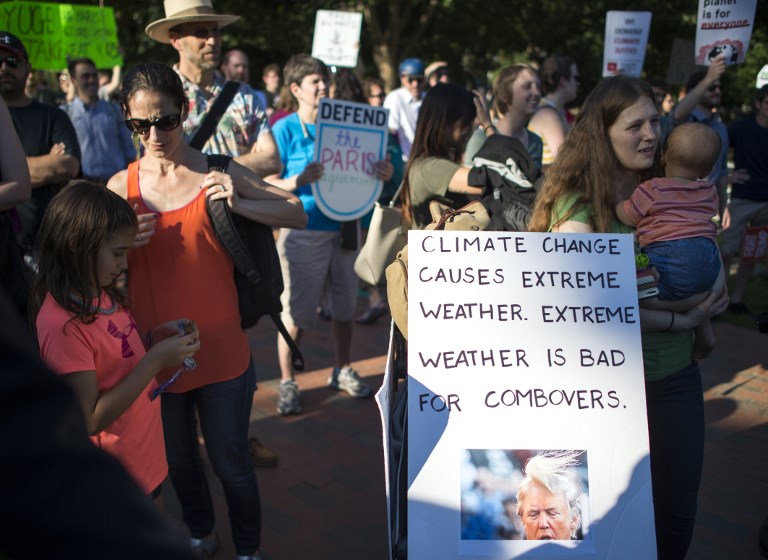Reckless and irresponsible

Protesters listen to speakers and hold up signs during a rally against the United States backing out of the Paris Climate accord, in front of the White House in Washington, DC on June 1, 2017. US President Donald Trump earlier announced America is “getting out” of a deal he said imposed “draconian” burdens that would cost the US millions of jobs and billions in cold hard cash. / AFP PHOTO / Andrew CABALLERO-REYNOLDS
In the event of a sea rise due to climate change, one of the places in the United States most vulnerable would be the coastal state of Florida. According to a CNN report last April, the National Oceanic and Atmospheric Administration “raised the specter of millions of coastal residents in the United States—especially along the low-lying East Coast—being displaced by coastal flooding. The agency outlined how sea levels could rise by at least four to five feet by century’s end, engulfing numerous coastal communities or making flooding so frequent as to render them uninhabitable.”
This means that “much of Florida’s coastline could one day be underwater.” And among those properties that are vulnerable to this development? US President Donald Trump’s. Said the CNN report: “Trump’s Mar-a-Lago Club and his condominiums in Hollywood, Florida, would be partially submerged if sea level rose three feet by the end of the century. Already, Hollywood experiences more incidents of tidal flooding.”
Article continues after this advertisementIn light of Trump’s withdrawal of the United States from the landmark 2015 Paris Agreement to fight global warming, it would be sheer poetic justice if his general disdain for the science behind climate change would come back one day to inundate his estates and give him a rude but too-late awakening. But since the projections are still by the end of the century, when Trump and his cohorts in the Republican Party who back his anti-climate actions would be dead by then, that ruinous prospect doesn’t appear to faze the former reality TV star at this time.
He has framed the US withdrawal from the Paris accord as a way of protecting the American economy: Staying on would mean the loss of American jobs and sovereignty. “We don’t want other leaders and other countries laughing at us any more,” he said in his speech. And, anyway, “Even if the Paris Agreement were implemented in full, with total compliance from all nations, it is estimated it would only produce 0.2 of 1 degree [Celsius reduction by 2100].”
The reaction wasn’t laughter but more like horror at Trump’s action—and not only on the international front. Immediately after Trump’s announcement of withdrawal, a group of 187 mayors and 10 governors across America declared that they would all ignore his decision, and instead work independently to meet their cities’ clean-air goals to help contribute to the collective target of limiting global warming to 1.5 degrees Celsius or below within this century.
Article continues after this advertisementMeanwhile, the Massachusetts Institute of Technology researchers whose 2016 climate change study Trump had apparently referenced in his speech denounced his use of the research figures as “misleading.” They reiterated their support for the Paris Agreement. An array of world leaders and scientists, and the heads of Apple, Google, Tesla, Twitter, Facebook and other tech titans also expressed their dismay.
The international consensus is clear: The US withdrawal would significantly weaken the Paris accord, chiefly because America is the biggest contributor to global warming. “The United States, with its love of big cars, big houses and blasting air-conditioners, has contributed more than any other country to the atmospheric carbon dioxide that is scorching the planet,” noted The New York Times.
Hence, abdicating its responsibility to help clean up its disproportionate share of the mess is America showing an ugly, reckless sense of irresponsibility, especially with smaller, more economically deprived countries like the Philippines that are the least to blame for global warming increasingly bearing the brunt of its devastating consequences.
It is now up to the rest of the international community to band together to save the planet. The president of the United States has once again demonstrated his inability to take the long view and lead on its behalf.
















